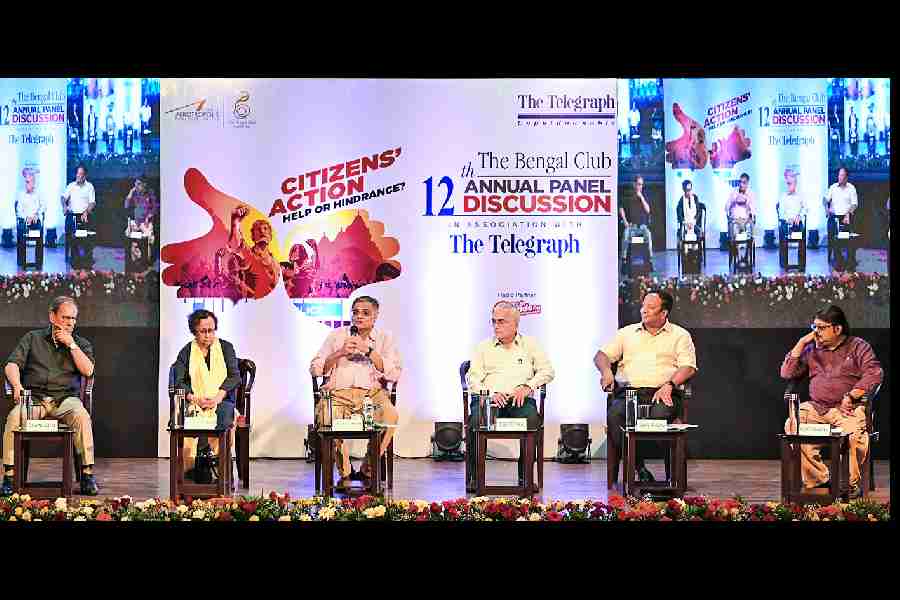Do citizens' actions lead to any results; do popular movements end up highlighting the leaders more than the cause; do citizens' contacts matter more than their actions?
These were some of the issues that were discussed at The Bengal Club 12th Annual Panel Discussion in association with The Telegraph held at the Indian Council of Cultural Relations (ICCR) hall on Saturday.
Former civil servants Kalyani Chaudhuri and Shyamal Datta, environmentalist Debi Goenka, journalist Sunil Prabhu and filmmaker Ashok Vishwanathan were the panellists at the discussion with the theme Citizens' Action, Help or Hindrance.
Neurosurgeon Sandip Chatterjee, the moderator for the evening, set off the discussions with the question of whether citizens' role would be limited to staying passive observers of democracy or whether citizens' actions should be common, rather than an exception.
Former governor of Nagaland and ex-IPS officer Shyamal Datta said: "Citizens' action was part of their citizenship". Citizenship is nothing but what a citizen feels, does and thinks."
Kalyani Chaudhuri, a retired IAS officer, shared her views on interacting with citizens' groups while she was in service. Though she was initially apprehensive about such interactions, Chaudhuri said, she realised with time that such interactions gave her useful information.
"Some of what they asked for could be done, some couldn't be done," she said.
After retirement, she is now a member of a group of retired civil servants named Constitutional Conduct Group that writes to the governments raising issues that need to be looked into. "The letters we write irritate the government. It is very important to also irritate people in positions of power," she said.
Environmentalist Debi Goenka highlighted the mushrooming of NGOs and said it was evidence that people were not happy with what the politicians or the bureaucrats delivered.
"I think the fact that so many NGOs still exist is evidence that people have complaints about politicians and bureaucracy," he said.
Journalist Sunil Prabhu spoke about how the farmers' protests led to a repeal of the farm laws. The protests continued through 2020 and 2021 against three farm laws that were eventually revoked.
"The farmers stood their ground for months and finally the government had to revoke the laws. It is true that citizens' movements involve months of struggle," said Prabhu.
Moderator Chatterjee cited an example where a friend of his was hit by a motorcycle that was being driven by a civic volunteer. When the man's wife and daughter went to lodge an FIR, a necessity for the insurance claim, they were refused by three police stations. Finally, one police station took the complaint after being told that the matter will be raised with senior police officers, said Chatterjee.
"Is it also that in India, citizens' contacts mattered more than citizens' actions?" he asked.
Most panellists concurred.
"I think contacts matter and it is sad," said Viswanathan, also a professor at Satyajit Ray Film and Television Institute.
"It is very difficult for someone without economic strength or social standing, but I will also say that citizens' action is required. The movements surrounding the killing of Jessica Lal or Nirbhaya are examples of what citizens' actions can do," he said.
Kunal Sen, president of The Bengal Club, welcomed the panellists and guests before the start of the discussions.
Pedestrian hit
Kasba: A 45-year-old pedestrian, Sarabindo Baidya, suffered multiple injuries when a state bus hit him on EM Bypass, near the Kalikapur crossing, on Tuesday afternoon.
